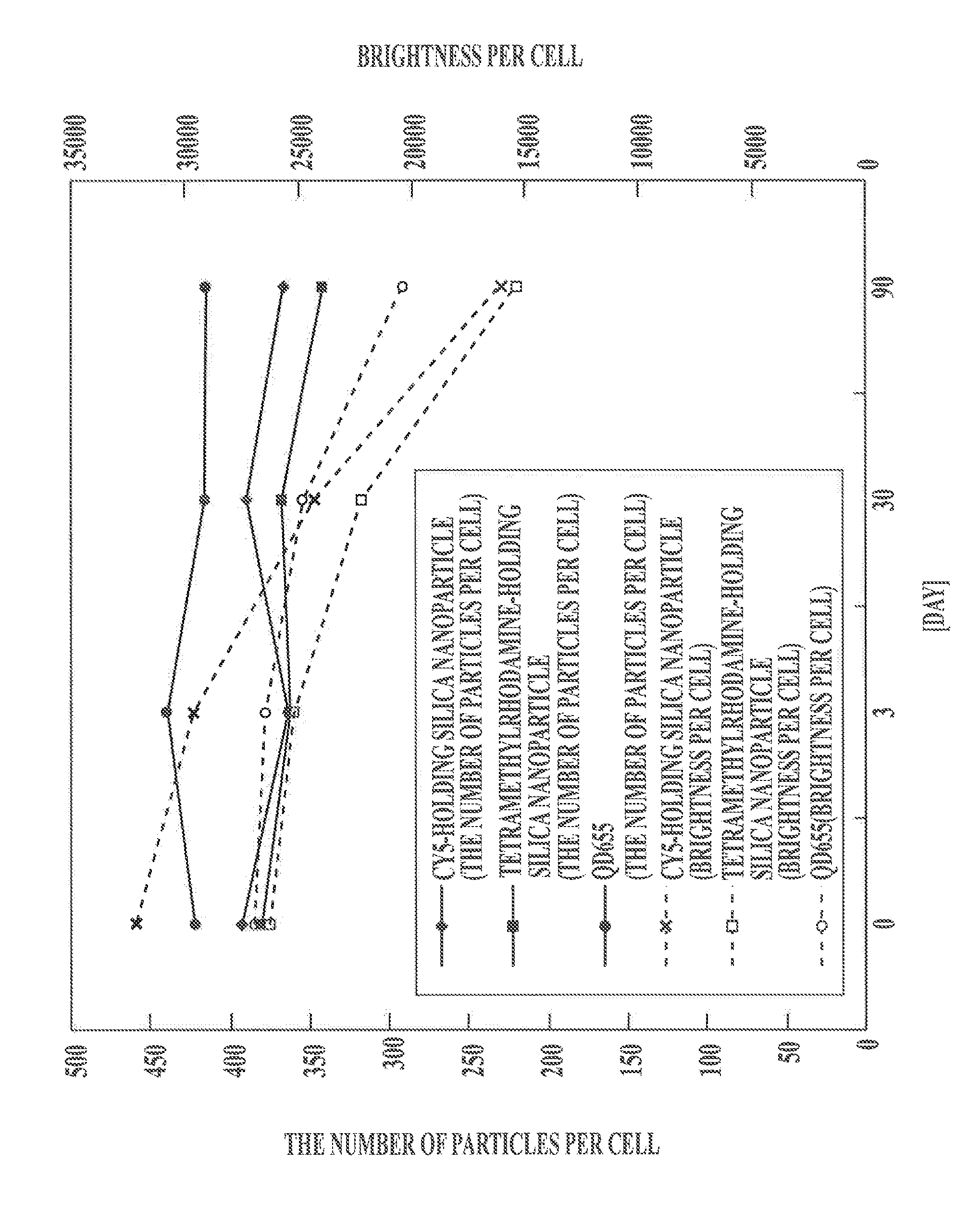Tissue staining method, tissue evaluation method and biosubstance detection method
a tissue staining and tissue evaluation technology, applied in the field of tissue staining and tissue evaluation methods, can solve the problems of inability to automatically determine a significantly small amount of biomarkers, the luminescent brightness is too weak, and the equipment for pathological diagnosis support cannot maximize its performance in precise quantitative measurement, etc., to achieve stable evaluation results, high fluorescence observation, and high sensitivity
- Summary
- Abstract
- Description
- Claims
- Application Information
AI Technical Summary
Benefits of technology
Problems solved by technology
Method used
Image
Examples
example 1
Procedure 1: Synthesis of Phosphor-Containing Particles
[0094]An organoalkoxysilane compound was obtained by mixing 6.6 mg of tetramethylrhodamine (TAMRA-SE, manufactured by Invitrogen Corporation) and 3 μL of 3-aminopropyltrimethoxysilane (KBM903, manufactured by Shin-Etsu Silicone) in DMF, Then, 0.6 mL of the obtained organoalkoxysilane compound was mixed with 48 mL of ethanol, 0.6 mL of tetraethoxysilane (TEOS), 2 mL of water, and 2 mL of 28% aqueous ammonia for 3 hours.
[0095]The liquid mixture prepared in the above step was centrifuged at 10000 G for 20 minutes, and the supernatant was removed. Thereafter, ethanol was added to disperse the precipitate therein, and the dispersion was centrifuged again. The precipitate was washed twice with each of ethanol and pure water by the same procedure.
[0096]The obtained tetramethylrhodamine-containing silica nanoparticles were observed with an SEM to measure particle diameters of 200 particles. The average particle diameter was 104 nm, and ...
example 2
Procedure 1: Synthesis of Phosphor-Holding Particles
[0131]An organoalkoxysilane compound was obtained by mixing 6.6 mg of tetramethylrhodamine (TAMRA-SE, manufactured by Invitrogen Corporation) (excitation wavelength: 550 nm, emission wavelength: 570 nm) and 3 μL of 3-aminopropyltrimethoxysilane (KBM903, manufactured by Shin-Etsu Silicone) in DMF. Then, 0.6 mL of the obtained organoalkoxysilane compound was mixed with 48 mL of ethanol, 0.6 mL of tetraethoxysilane (TEOS), 2 mL, of water, and 2 mL of 28% aqueous ammonia for 3 hours.
[0132]The liquid mixture prepared by the above steps was centrifuged at 10000 G for 20 minutes, and the supernatant was removed. Thereafter, ethanol was added to disperse the precipitate therein, and the liquid mixture was centrifuged again. The precipitate was washed twice with each of ethanol and pure water by the same procedure.
[0133]The obtained tetramethylrhodamine-holding silica nanoparticles were observed with an SEM to measure particle diameters of ...
example 3
Synthesis of Phosphor-Containing Nanoparticles a to f
PUM
 Login to View More
Login to View More Abstract
Description
Claims
Application Information
 Login to View More
Login to View More - R&D
- Intellectual Property
- Life Sciences
- Materials
- Tech Scout
- Unparalleled Data Quality
- Higher Quality Content
- 60% Fewer Hallucinations
Browse by: Latest US Patents, China's latest patents, Technical Efficacy Thesaurus, Application Domain, Technology Topic, Popular Technical Reports.
© 2025 PatSnap. All rights reserved.Legal|Privacy policy|Modern Slavery Act Transparency Statement|Sitemap|About US| Contact US: help@patsnap.com

